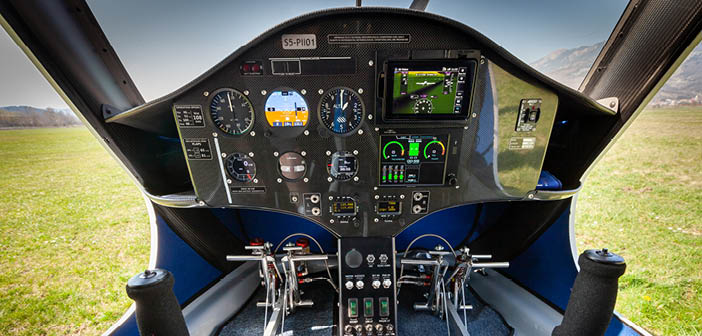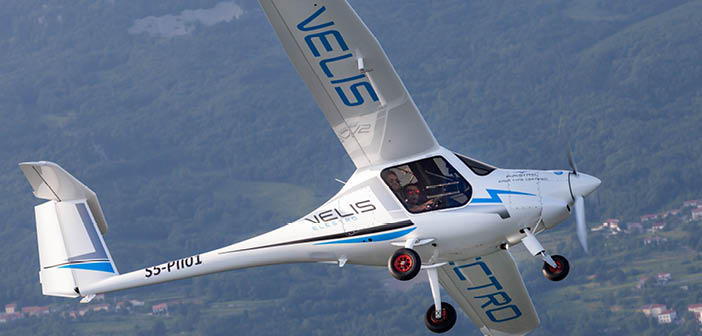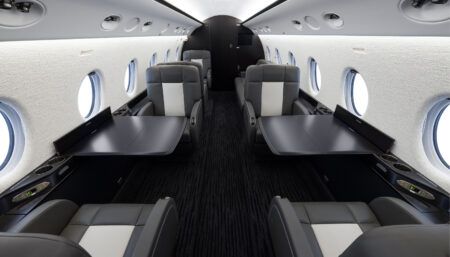Slovenian OEM Pipistrel has achieved a breakthrough with the world’s first certification of a fully electric aircraft. The Velis Electro, a two-seater intended primarily for pilot training, has been granted EASA certification, following years of intensive research. The manufacturer said EASA’s engagement was essential to the achievement.
Conceived as a fundamental part of the Velis Training System, the battery-powered Velis Electro was designed to be simple to operate and maintain, without compromising safety. Employing Pipistrel’s type certified electric engine, the Velis Electro delivers power instantly and without hesitation – using a simplified user interface in a cockpit that maintains the same look and feel of its conventionally powered siblings. The reduced number of moving parts is intended to dramatically decrease maintenance costs. The risk of malfunctions is further minimised through a built-in continuous health-monitoring system. Pipistrel says this enhanced reliability allows the Velis Electro to have more than double the lifespan of powertrain elements in comparison to the previous generation of electric aeroplanes.
The powertrain is entirely liquid-cooled, including the batteries, and demonstrated the ability to withstand faults, battery thermal runaway events and crash loads as part of the certification process. Pipistrel says the reduction in operating costs makes pilot training more affordable.

“The type certification of the Pipistrel Velis Electro is the first step towards the commercial use of electric aircraft, which is needed to make emission-free aviation feasible,” said Ivo Boscarol, founder and CEO of Pipistrel Aircraft. “It is considerably quieter than other aeroplanes and produces no combustion gases at all. It confirms and provides optimism, also to other electric aircraft designers, that the type certificate of electric engines and aeroplanes is possible. The engine, which Pipistrel type-certified separately, is also available to other aircraft OEMs. For Pipistrel, this achievement injects additional motivation for the future eVTOL and multi-seat hydrogen-powered projects. Pipistrel is especially thankful to all our customers for their confidence in our products, which allows us to continue developing these innovative aircraft.”
“For EASA, the type certification of this aircraft marks a significant dual milestone: on 18 May 2020 we type certified its engine as the first electric engine – now we have followed up with the first type certification of a plane flying that engine,” said Dominique Roland, head of the general aviation department at EASA. “This was a truly ground-breaking project that has yielded many learnings for the future certification of electric engines and aircraft, undoubtedly a growth area in coming years in line with the aims of environmental protection.”
“It should also be noted that this innovative product was, despite the many challenging aspects, certified in less than three years, showing the excellent work performed by Pipistrel and the EASA teams,” continued Roland. “Finally, it is worth mentioning that the certification team was composed of EASA staff, but included experts from the Swiss and French authorities, in order to prepare and facilitate the entry into service of the Velis Electro in these two countries.”

The certification project developed in two streams: as well as the typical certification activities related to the aircraft, there was a coordinated flight test programme using a fleet of (non-certified) Alpha-Electros under EASA permit to fly. EASA noted its involvement in the project gave it first-hand experience in electric flight, increasing its knowledge of batteries, their management systems, and electrical engine power units. This information has been used to develop the E&HPS Special Condition to further enable electric flight.
“The Velis Electro project has been one of those engineering challenges we like at Pipistrel,” said Paolo Romagnolli, head of engineering at the company. “EASA type certification is an un-compromised affirmation of the safety of the design. Having achieved this with a relatively small team is proof that young, talented and motivated professionals can bring innovation into reality. Completing the work nobody else has ever done before makes us all very proud of being members of this engineering team.”
Pipistrel plans to deliver the first 31 Velis Electro aircraft in 2020, to customers in seven countries.
“AlpinAirPlanes is very proud to be given the great opportunity by Pipistrel to be part of this game-changing journey,” said Marc B. Corpataux, the Velis Electro launch customer. “With more than 400 flight hours and 25 pilots introduced to the predecessor Alpha Electro, we are convinced of the suitability of electric flight in the daily flight school environment. Initially, we will distribute 12 aircraft on 10 airfields over Switzerland. Each base will be equipped with 150m² (1,615ft²) of photovoltaic panels, producing electricity for 12,000 flight hours per year on the Velis Electro. We are happy to offer the most environmentally friendly training possible.”
Images and video: Pipistrel, www.pipistrel-aircraft.com




